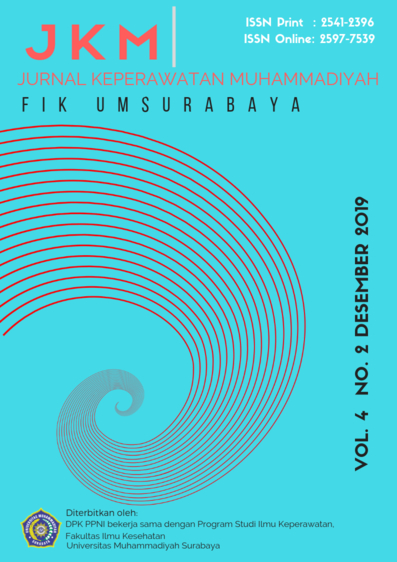Efektifitas Pemberdayaan Keluarga Terhadap Kontrol Metabolik Pada Pasien Diabetes Mellitus Tipe 2
DOI:
https://doi.org/10.30651/jkm.v4i2.3067Keywords:
Pemberdayaan keluarga, kontrol metabolik, diabetes mellitus tipe 2.Abstract
Background : Family empowerment plays an important role in the management of diabetes mellitus experienced by family members. Because of the chronic nature of this disease, people with diabetes mellitus need long-term assistance to improve self-care and delay chronic complications from diabetes mellitus through glycemic control. Aim : To conduct a systematic review and assess the effectiveness of family empowerment for metabolic control in patients with type 2 diabetes mellitus. Method : Systematic reviews are carried out using electronic databases in article searches such as PubMed, ScienceDirect, ProQuest, Google Scholar. Results: After reviewing five articles it was found that family-based intervention or by empowering families in the care of patients with diabetes mellitus played a role in decreasing HbA1c as an indicator in glycemic control. And the most widely used instruments are the scale of self-care and diabetes activity (SDSCA), the diabetes empowerment scale (DES) and the diabetes knowledge questionnaire (DKQ). Conclusion : From the review of the article reviewed it can be concluded that families must be involved in the care of people with diabetes mellitus, diabetes education given only to individuals with type 2 diabetes limits the impact on patients, therefore empowering families will provide a large role in the management of chronic diseases that emphasize context where this disease occurs including the family's physical environment, education, and the personal needs of patients and family members. Helps develop healthy family behavior and shows self-management of diabetic patients, especially in health care programs, especially those who are able to promote various forms of social support, glycemic control and to strengthen ties between family members.Keywords : Family empowerment, metabolic control, type 2 diabetes mellitus.References
American Diabetes Association. (2018a). Glycemic Targets : Standars of Medical Care in Diabetes. Diabetes Care, 41. https://doi.org/http://doi.org/10.2337/dc18-S006
American Diabetes Association. (2018b). Summary of Revisions: Standards of Medical Care in Diabetes—2018. Diabetes Care, 41(Supplement 1), S4–S6. https://doi.org/10.2337/dc18-Srev01
Anderson, R. M., & Funnell, M. M. (2011). Patient Empowerment: Myths and Misconseption, 79(3), 277–282. https://doi.org/10.1016/j.pec.2009.07.025.Patient
Burns, K. K., Nicolucci, A., Holt, R. I. G., Willaing, I., Hermanns, N., Kalra, S., … Group, S. (2013). Research : Educational and Psychological Issues Diabetes Attitudes , Wishes and Needs second study ( DAWN2 TM ): Cross-national benchmarking indicators for family members living with people with diabetes, 778–788. https://doi.org/10.1111/dme.12239
Cai, C., & Hu, J. (2016). Effectiveness of a Family-based Diabetes Self-management Educational Intervention for Chinese Adults With Type 2 Diabetes in Wuhan, China. Diabetes Educator, 42(6), 697–711. https://doi.org/10.1177/0145721716674325
Chugh S. (2011). Gold Standard Mini atlas series Diabetes. India: Jaypee Brothers Medical.
Fesseha, B. K., Abularrage, C. J., Hines, K. F., Sherman, R., Frost, P., Langan, S., … Mathioudakis, N. (2018). familiar history of diabetes. Diabetes Care, 41(7), 1478–1485. https://doi.org/10.2337/dc17-1683
Fotoukian, Z., Shahboulaghi, F. M., Khoshknab, M. F., & Mohammadi, E. (2014). Concept Analysis of Empowerment in Old People with Chronic Diseases Using a Hybrid Model. Asian Nursing Research, 8(2), 118–127. https://doi.org/10.1016/j.anr.2014.04.002
Friedman, M. ., Browden, V. ., & Jones, E. . (2010). Buku Ajar Keperawatan Keluarga : Riset, teori, dan praktik. (A. Y. S. Hamid, Ed.) (5th ed.). Jakarta: EGC.
Gomes, L. C., Coelho, A. C. M., Gomides, D. dos S., Foss-Freitas, M. C., Foss, M. C., & Pace, A. E. (2017). Contribution of family social support to the metabolic control of people with diabetes mellitus: A randomized controlled clinical trial. Applied Nursing Research, 36, 68–76. https://doi.org/10.1016/j.apnr.2017.05.009
Luczynski, W., Glowinska, B., & Artur Bossowsl. (2016). Empowerment in the Treatment of Diabetes and Obesity, 2016.
McEwen, M. M., Pasvogel, A., Murdaugh, C., & Hepworth, J. (2017). Effects of a Family-based Diabetes Intervention on Behavioral and Biological Outcomes for Mexican American Adults. Diabetes Educator, 43(3), 272–285. https://doi.org/10.1177/0145721717706031
Rabelo, C., Sanches, C., Di, C., Oliveira, L., Cristina, G., Alves, S., … Oliveira, A. (2017). Effectiveness of individual strategies for the empowerment of patients with diabetes mellitus : A systematic review with meta-analysis. Primary Care Diabetes. https://doi.org/10.1016/j.pcd.2017.10.004
Rafehi, H., El-Osta, A., & Karagiannis, T. C. (2012). Epigenetic mechanisms in the pathogenesis of diabetic foot ulcers. Journal of Diabetes and Its Complications. https://doi.org/10.1016/j.jdiacomp.2012.05.015
Ragi, N., Azevedo, J., Sanches-giraud, C., Di, C., Oliveira, L., Carvalho, R., … Oliveira, A. (2016). Collective empowerment strategies for patients with Diabetes Mellitus : A systematic review and meta-analysis. Primary Care Diabetes, 11(2), 201–211. https://doi.org/10.1016/j.pcd.2016.09.006
Tol, A., Alhani, F., Shojaeazadeh, D., Sharifirad, G., & Moazam, N. (2015). An empowering approach to promote the quality of life and self-management among type 2 diabetic patients, 4(March), 1–8. https://doi.org/10.4103/2277-9531.154022
Tol, A., Shojaeezadeh, D., Sharifirad, G., Alhani, F., & Tehrani, M. M. (2012). Original Article Determination of empowerment score in type 2 diabetes patients and its related factors.
Wichit, N., Mnatzaganian, G., Courtney, M., & Schulz, P. (2016). Randomized controlled trial of a family-oriented self-management program to improve self-efficacy , glycemic control and quality of life among Thai individuals with Type 2 diabetes. Diabetes Research and Clinical Practice, 123, 37–48. https://doi.org/10.1016/j.diabres.2016.11.013
Downloads
Published
Issue
Section
License
- Penulis tetap memegang hak atas karyanya dan memberikan hak publikasi pertama kepada jurnal ini yang secara simultan karya tersebut dilisensikan di bawah:Â Creative Commons Attribution-ShareAlike 4.0 International (CC BY-SA 4.0)













